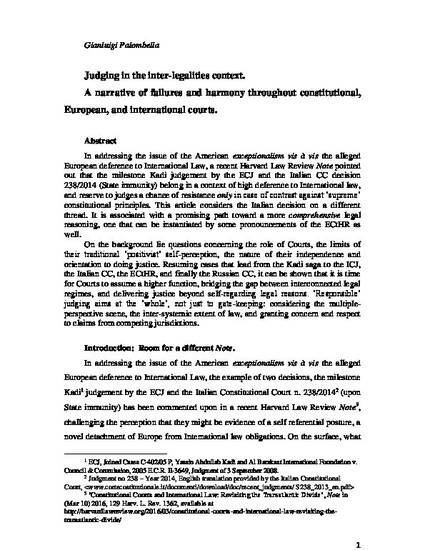
Article
judging in interlegalities_.docx
working paper
(2016)
Abstract
In addressing the issue of the American exceptionalismvis à vis the alleged European deference to International Law, a recent Harvard Law Review Note pointed out that the milestone Kadi judgement by the ECJ and the Italian CC decision 238/2014 (State immunity) belong in a context of high deference to International law, and reserve to judges a chance of resistance only in case of contrast against ‘supreme’ constitutional principles. This article considers the Italian decision on a different thread. It is associated with a promising path toward a more comprehensive legal reasoning, one that can be instantiated by some pronouncements of the ECtHR as well.
On the background lie questions concerning the role of Courts, the limits of their traditional ‘positivist’ self-perception, the nature of their independence and orientation to doing justice. Resuming cases that lead from the Kadi saga to the ICJ, the Italian CC, the ECtHR, and finally the Russian CC, it can be shown that it is time for Courts to assume a higher function, bridging the gap between interconnected legal regimes, and delivering justice beyond self-regarding legal reasons. ‘Responsible’ judging aims at the ‘whole’, not just to gate-keeping: considering the multiple-perspective scene, the inter-systemic extent of law, and granting concern and respect to claims from competing jurisdictions.
Keywords
- inter-jurisdictions judging,
- responsible judge,
- role of courts,
- CJEU,
- ICJ,
- Italian Constitutional Court,
- Russian Constitutional Court,
- ECtHR,
- Kadi,
- German v Italy,
- Anchugov,
- Al Jedda,
- Al Dulimi
Disciplines
Publication Date
2016
Citation Information
Gianluigi Palombella. "judging in interlegalities_.docx" working paper (2016) Available at: http://works.bepress.com/gianluigi_palombella/20/
